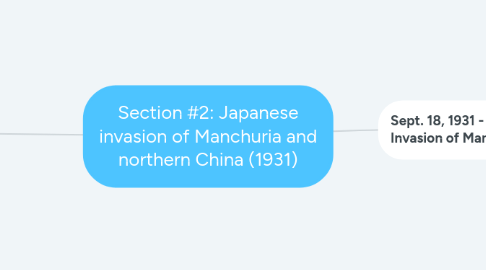
1. Sept. 18, 1931: Mukden Incident
1.1. Kwantung Army had to replan Manchurian Takeover after failure of Huanggutan Incident
1.2. Kwantung Army acts against wishes of cabinet
1.3. Faked sabotage and blamed it on the Chinese as an excuse to invade
1.4. “Ruse de Guerre”
2. Sept. 18, 1931 - Feb. 27, 1932: Invasion of Manchuria
2.1. "Ruse De Guerre" successful
2.1.1. China retreats from Mukeden and Kwantung Army invades
2.2. PM Wakatsuki calls for non expansion of hostilities, but Kwantung Army went further
2.3. Hurt Japan's relations with the West
2.3.1. Potential Causes;
2.3.1.1. Desire for equality with the west
2.3.1.2. Need for strategic security
2.3.1.3. Nationalism/Belief in superiority of Japan
2.3.1.4. Chinese political situation
2.3.1.5. Domestic Political shifts
2.3.1.6. Economic Crisis
2.4. Puppet State of Manchukuo
2.4.1. Japanese puppet state established with Pu Yi as leader
2.4.2. Brutal control of colonies by Japan
2.5. Aftermath of Manchuria Invasion
2.5.1. No deals arranged
2.5.2. Don't fully commit troops to manchuria
2.5.3. Chinese people lead massive boycott of japanese goods
2.5.4. 1933-1935: GMD cedes more territory, selling space to buy time
2.5.5. Chang turns to the league for help
2.5.5.1. Narrative of Japanese aggression following nationalist takeover
2.5.5.2. Complete breakdown of a diplomatic relationship
2.6. Japan and the LoN
2.6.1. Whole purpose of the LoN was to establish collective security
2.6.1.1. States would take joint action to deal with aggression
2.7. Lytton Report and LoN
2.7.1. League sends British representative - the Earl of Lytton - to investigate events in Manchuria
2.7.1.1. takes months as Kwantung Army continues to expand
2.7.2. Lytton condemned Japan
2.7.2.1. Labeled the invasion as unprovoked
2.7.2.2. Called for withdrawal
2.7.3. Labales Manchukuo as puppet state of Japan
2.7.4. Recommend the solution of a trade agreement and a non aggression pact
2.8. Results for Japan
2.8.1. Economic benefits of expansion through China
2.8.2. Need sizable Japanese army to occupy Manchuria
2.8.2.1. Costly
2.8.2.1.1. Solution: Tax people in Japan
2.8.3. Japan’s “Monroe Doctrine”
2.8.3.1. Goal: Keep Europe out of Asia
2.8.4. Japan was flying solo in their international relations
2.8.4.1. Stretched a little too thin
2.8.5. Shaky situation to put itself in with Soviet and US naval threat looming
2.8.6. It was the army, not the government, that was the lead decision maker
2.8.7. Popular support for Kwantung army
2.8.8. “Heroes” of Manchuria forced Japanese government to kowtow to army’s actions
